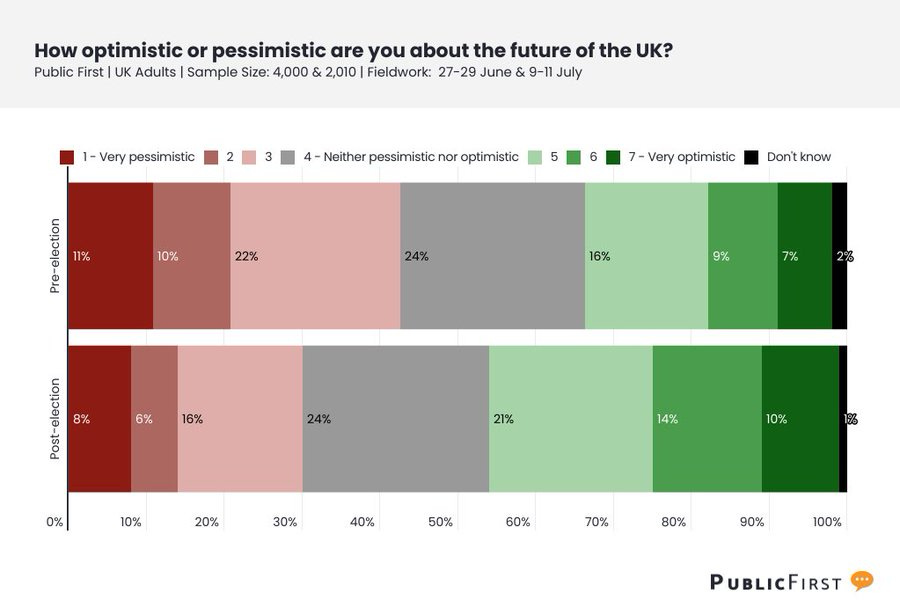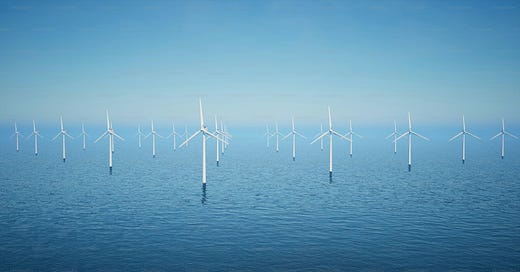EE#28 Labour's Green Honeymoon
Ensuring a long happy marriage of Labour's voters to energy and climate
A summer honeymoon, it's sunny, hot, the relationship is fresh, and nothing can dampen spirits. Whether it's in our polling, or focus groups people are feeling positive, feeling that things are about to change for the better.* The public is giving the new government space to act and prove that optimism should be warranted.

It’s not just the public that is giving Labour a honeymoon. The private sector too is letting things play out, allowing the new government to get on with the things it said it would.
Nowhere is that more true than in energy, which is dominating the new government’s agenda. Labour has gone big on new generation. Whether that’s the onshore wind unblocking or task force, signing off new solar developments, or the founding document for Great British Energy - the focus is to build more renewables, fast. And bar a few Tory MPs keen for their backyards to stay as they are, they have received remarkably little criticism. Why?
The easy answer is that none of this, really, is new. Everything Labour has done has been heavily trailed. Rachel Reeves and Ed Miliband have been chanting planning and grid on repeat for years. To do something else wouldn’t fit with Labour’s stability mantra. The GB Energy statement was the slight exception to this, which included some new commitments, but as Labour’s No1 political priority, adored by the public at least in the abstract, it was never going to kick up a fuss.
Labour is also less likely to face criticism when they are united. If external critics want to take umbrage at something, you need someone internal to share your view. Clean generation unites not just the Labour Party, but its voting coalition. It’s about proving the country can build stuff (particularly stuff that the public likes very much indeed), quickly. It’s not just the change, but the pace of change that both Reeves and Miliband have driven through.

The government is clearly committed to holding its various coalitions together. The riots are a case and point. Labour has focused on crime, which holds its voters together, rather than whatever false justification rioters have given themselves, which might not. Like on generation, Labour can carry one message to the whole country, and not worry about different fronts with Reform, Greens or SNP. The government will keep a close eye on focus groups and polls, both to monitor their honeymoon and to ensure that emerging issues don’t split their 2029 voters.
Generation is proof of Labour’s ‘Delivery-ism’, but it also shows their commitment to incrementalism. Planning is the archetype here. The country is not getting a whole new planning system - scary. It’s getting adjustments and reforms of the current system - reassuring. Raising the threshold for Nationally Strategic Infrastructure Projects, or lowering requirements for clean technologies is not radical enough to inspire a backlash. Incrementalism especially for planning isn’t exactly cautious, it's a damn sight more than the last government was willing to do, but it has lower immediate risk. There is always the possibility of what happens when incrementalism doesn’t deliver what you need but that’s for future Keir to worry about. The current system will constrain outcomes but it will also constrain risk, given opponents less space to argue.
I am not saying that this honeymoon will be short-lived, goodwill will collapse, its all going to be terrible. I am optimistic, and isn’t it nice to see things get done? I want more things to get done.
We do though need to get ahead of the issues that are going to be vital to achieving Labour’s explicit goals - 2030 Clean Power - and their implicit ones - proving voters can trust the party to make change for the better. These could be issues that threaten to split the coalition or have marked trade-offs between departments.
The two that stick out in the short term are the interrelated demand management and consumer interaction with net zero. Chris Stark is almost certainly going to turn around to his Mission Control and say, we can only hit 2030 if we start to reduce energy demand. There are a million and one ways to do this, but for No10, there could be concerns that supporting electrical vehicle uptake or home decarbonisation will be received differently in Reform-facing seats and Green-facing ones.
Lots rests in the policy design. Labour will be keen to set lower and more achievable ambitions to prove change is viable. That means getting the right support from outside government. I’m not asking for everyone lobbying government to be in a permanent honeymoon, refusing to criticise, it’s about understanding what Labour’s political objectives are and workign with them. If we want changes that the government hasn’t yet signalled, then we need to be able to credibly say who policy should target and where they are in Labour’s 2024 coalition. At a minimum, we should be able to de-risk those in the coalition that might not be supportive.
Marriages go on after the honeymoon, you rely less on newness and good will and more on negotiation and understanding of how each other work. This is going to be essential when inevitably Labour’s rapid set of actions slow, or progress stalls.
*Follow Denise!





